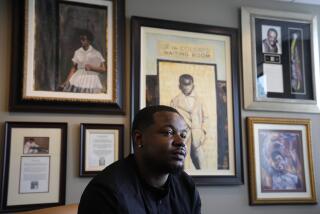Suspects May Be Linked to Tucson Shooting
- Share via
WASHINGTON — Authorities said Tuesday they are investigating whether alleged serial snipers John Allen Muhammad and Lee Boyd Malvo killed a man on a Tucson golf course in March after arriving from Los Angeles -- the first indication the pair had been in Southern California.
If the pair are linked to the Tucson slaying, it would extend the reach of their alleged killing spree to almost every corner of the nation. They have been linked to 17 shootings, 13 of them fatal, in Virginia, the District of Columbia, Maryland, Alabama, Louisiana and the state of Washington. Police are investigating the suspects in three other shootings, for a total of 20 crime scenes.
Tucson Police Chief Richard Miranda said that golfer Jerry R. Taylor, 60, was shot March 19 with a high-powered rifle, though no bullet was recovered from the body and no witnesses have been found. An autopsy disclosed that Taylor’s wound was consistent with the tissue damage caused by the type of sniper rifle allegedly used by Muhammad and Malvo, Miranda said.
FBI officials have placed the pair in Tucson from March 13 to March 25, based on passenger manifests from bus lines. The two arrived in Tucson from Los Angeles, FBI officials told Miranda.
Lt. Don Hartwell, a senior homicide detective with the Los Angeles Police Department, said LAPD investigators have not linked any slayings to the two. But Los Angeles has recorded 563 killings this year, leaving many cases to consider.
Muhammad and Malvo traveled to Tucson to visit Muhammad’s sister, Odessa Newell, who was stationed at Davis-Monthan Air Force Base, Miranda said. They told her they were leaving March 16 when she dropped them off at a bus station, but passenger manifests show they did not leave until March 25, Miranda said. She has since moved to New Orleans and might go by the name Odessa Williams.
Separately, law enforcement officials in Maryland said Tuesday that it appears the Sony laptop computer stolen in a Sept. 5 shooting at a Prince George’s County liquor store is the same one recovered from Muhammad’s Chevrolet Caprice.
The serial number on the laptop had been scratched off, but FBI computer experts were able to trace the laptop by examining its hard drive, an official said. The Sept. 5 shooting has been linked by ballistic evidence to one that occurred 10 days later, and the official said the laptop could tie the suspects to the earlier shooting.
Justice Department officials, meanwhile, said they were getting closer to deciding which jurisdiction would prosecute the two suspects first. They will face their first trial in either federal court in Maryland or state court in Virginia, an official said. Prosecutors from a number of offices met Tuesday to discuss the decision.
But a public defender representing Muhammad questioned the strength of the government’s case against the sniper suspects, saying that prosecutors’ reliance on a seized extortion note amounted to “a stretch” to support a federal indictment.
During a detention hearing in U.S. District Court in Greenbelt, Md., James Wyda, a federal public defender, said an extortion note recovered Oct. 19 by police near a Virginia shooting scene was weak evidence on which to mount a federal murder case because all but one shooting had already occurred.
“This is no longer a murder case,” Wyda said outside the courtroom. “This is an extortion case. They can’t prove extortion. They can’t meet their burden of proof in making this a federal case.”
But a federal magistrate agreed with prosecutors to keep Muhammad in detention because he represents a “danger to the community” and a “flight risk.”
“There is probable cause to believe the defendant participated in a series of multiple murders,” said U.S. Chief Magistrate Jillyn K. Schulze, who ordered Muhammad held without bail.
Appearing at the hearing in a magenta jumpsuit, Muhammad said nothing, flexing his hands after U.S. marshals removed his manacles. Muhammad seemed more alert than he had during his first arraignment last month.
Wyda characterized the sniper suspect’s extortion note that demanded $10 million as “crackpot, insane.” Without it, he said, the federal government has a case built only on circumstantial evidence.
“The government’s case has significant problems,” Wyda said, noting that neither police nor prosecutors had produced any eyewitness accounts of the shootings. “There’s no direct evidence that Mr. Muhammad was at the scene of any of these crimes.”
Both the Justice Department and the U.S. attorney in Baltimore, Thomas M. DiBiagio, are actively considering charging Muhammad with murder under the Hobbs Act, a federal statute that allows for the prosecution of murder if a homicide was committed during an extortion attempt.
A guilty verdict could lead to a federal death sentence.
James Trusty, an assistant U.S. attorney for the southern district of Maryland, raised the possibility of the death sentence as a compelling reason for Muhammad to be kept in custody.
Trying to show that Muhammad has a history of fabricating his past, the prosecutor also detailed several aliases and false identification papers that Muhammad has allegedly used. Trusty said Muhammad had used the names Wayne Weeks, Wayne Weekley, Charles Douglas and Thomas Lee. Each of the names had a different, false birth date, ranging from December 1960 to December 1970, Trusty said.
Antiguan government documents obtained Tuesday by The Times bolstered Trusty’s statements about Muhammad’s use of a “Thomas Lee” alias.
The records indicate that Muhammad used the name “Thomas Allen Lee” when he arrived in Antigua on March 28, 2000.
On an arrival card filled out aboard a plane bound for Antigua, Muhammad declared that he was born in Harrisburg, Pa., and cited his profession as “car repair.”
Muhammad used a Wyoming driver’s license under the Lee name as proof. And the documents also indicate that Muhammad used the Lee name as aliases for the three children he brought into the country with him.
“He used various names at various times,” Trusty said, adding that federal investigators had been unable to find a “fixed address” for the suspect.
*
Times staff writer Mark Fineman in Antigua contributed to this report.
More to Read
Sign up for Essential California
The most important California stories and recommendations in your inbox every morning.
You may occasionally receive promotional content from the Los Angeles Times.











